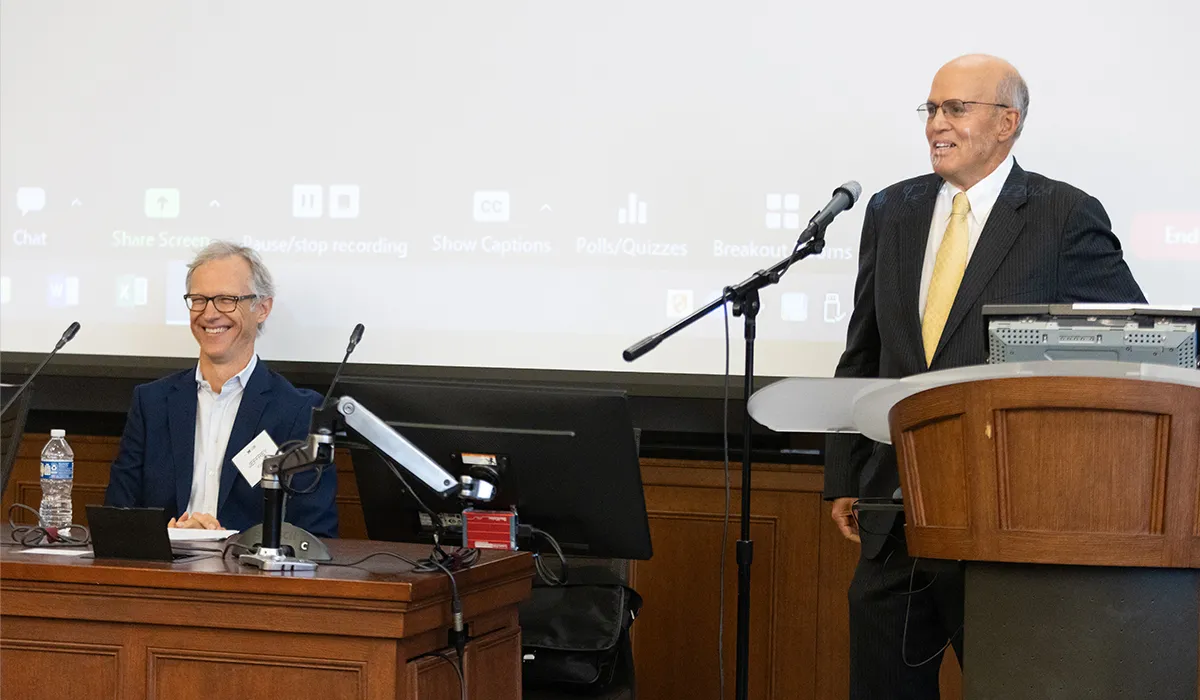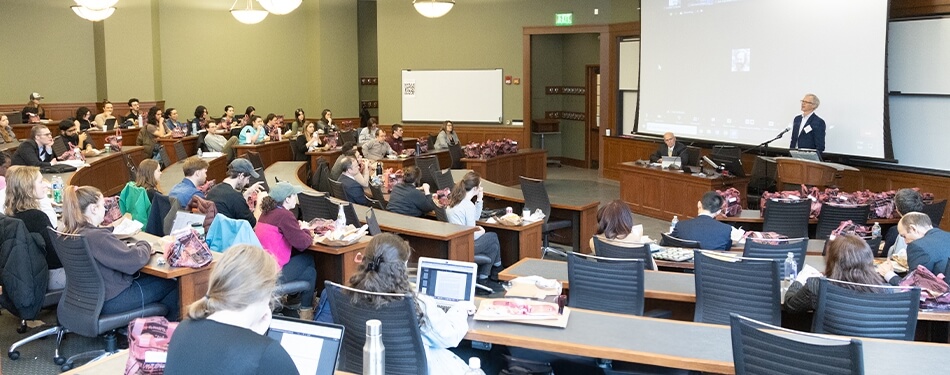Twenty years ago, a Michigan Law alumnus, Jeffrey Fisher, ’97—largely drawing on the work of Michigan Law Professor Richard Friedman—successfully argued before the Supreme Court in Crawford v. Washington for a new approach to the Constitution’s Confrontation Clause.
That decision strengthened the right of criminal defendants to demand that witnesses testifying against them be brought into court for cross-examination—adopting a “testimonial” approach that Friedman had long advocated.
A recent symposium at the Law School—Crawford at 20: The Confrontation Clause—took stock of the decision and its effects after two decades. Sponsored by the Michigan Journal of Law Reform, the event drew experts from around the country—including Friedman and Fisher, who delivered a keynote address.

As Dean Kyle Logue noted in his opening remarks, Crawford “left many questions unanswered,” and the symposium explored some of them. Here are four takeaways from speakers at the event:
1. Crawford didn’t settle everything.
The Crawford ruling may have established a new way of thinking about an important right, but it and its follow-up cases left a lot up in the air. Two of the participants in the symposium’s first panel discussion—Paul Rothstein and Ronald Coleman, both of the Georgetown University Law Center—highlighted a number of outstanding issues.
Michigan Law’s David Moran, ’91, clinical professor of law and co-director of the Michigan Innocence Clinic, spoke about another unresolved issue: how to think about a dying-declaration exception to the confrontation right. If a dying person purports to identify his assailant but did not actually view the attack, should the statement be admitted? Historically, the answer was no, but the Michigan Supreme Court ruled the other way, and Moran’s cert petition to have the high court rule specifically on the issue was denied. “The issue has never been resolved,” Moran said.
2. Crawford offers lessons in how to change law.
Fisher—who is now a professor at Stanford Law School—noted in his keynote address that he did not specifically argue in Crawford for the Supreme Court to overrule any past cases. He said the experience suggested two important lessons in changing law through litigation.
First, look for ways to build coalitions and find common ground with those on the other side of the ideological divide. “Crawford shows that it can be done…maybe more often than you think,” Fisher said.
Second, work to win the long game. “If you think there’s a better mode of constitutional interpretation…work hard to persuade lawyers and the public of that view. I think the biggest project on the progressive side right now is to persuade the country and the Bar and everybody else that there’s a better, truer way to the Constitution.”
3. The Confrontation Clause helps us do the right thing.
In one of the afternoon panels, Sherman Clark, the Kirkland & Ellis Professor of Law at Michigan, noted that the Confrontation Clause helps force society to face up to its actions—such as accusing someone—which makes it more likely that the action will be ethical.
Borrowing a phrase from Hamlet, Clark said, ”The Confrontation Clause, in addition to protecting the rights of defendants, is designed to ‘catch the conscience of the king’—and the king is all of us.”
“It’s good for us to bear the weight of what we do,” he added, describing it as “ethical weight training” that builds self knowledge and dignity. “I think there are many areas in contemporary life where we are tempted to wash our hands of what we do. …The ignobility of accusing while hiding is part of the intuition that has always been behind the Confrontation Clause.”
4. After Crawford, dramatic hearsay reform is possible.
In the 20 years since Crawford, Friedman—the Alene and Allan F. Smith Professor of Law—has continued to lead on issues related to the Confrontation Clause. He successfully argued two follow-up cases, Hammon v. Indiana and Briscoe v. Virginia, before the Supreme Court; and he publishes the Confrontation Blog to keep abreast of the latest developments.
As part of his closing remarks at the symposium, Friedman argued that the Crawford decision could lead to a revolution in hearsay law. First, he noted that much of the common-law world has already abandoned the traditional rules against hearsay.
In the US, Crawford now protects an accused’s right to be confronted by adverse witnesses, which Friedman said largely eliminates the need for a hearsay prohibition in its current form: “What do we have to do with the hearsay rule? What do we need it for? And I think the answer frankly is, well, not much. Once you’ve got the confrontation right protected, you can do some dramatic things, and I hope that happens.”







